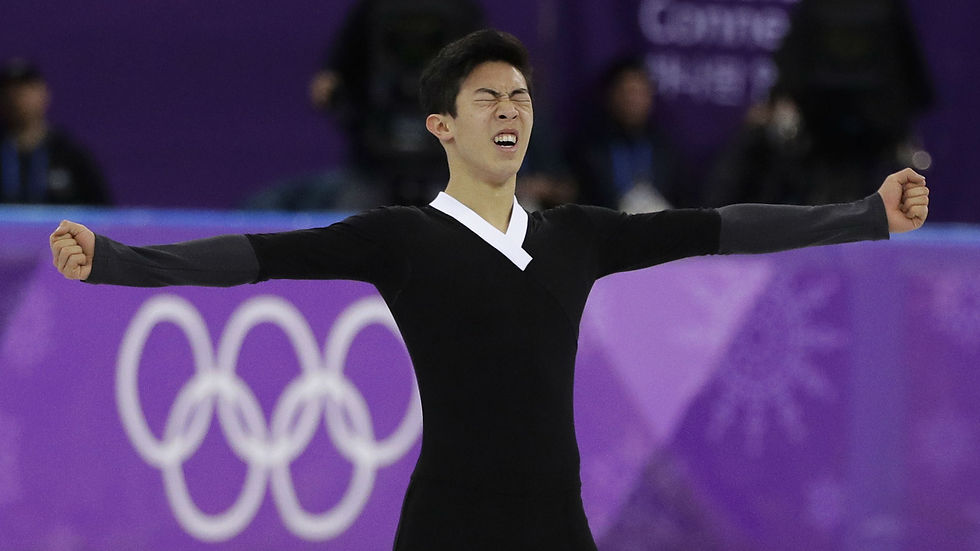See the Bar Exam as a Challenge, Not a Threat
- Tommy Sangchompuphen
- Feb 9, 2022
- 3 min read
Set a reminder for tonight. That’s when you can watch American Nathan Chen go for gold in the Olympics figure skating free skate competition.
Chen is one of the most decorated figure skaters of all-time—a six-time national champion, a three-time world champion, and the holder of multiple records for being the first to land various quadruple jumps at major competitions. But he has never won an individual Olympic medal.
However, he’s halfway home to winning Olympic gold. It would be redemption after a disappointing performance at the 2018 Olympic Games. Although he was expected to win gold there, Chen faltered in the short program of the men’s event, making errors on all three of his jumping passes, and landing in 17th place.
Some said the pressure got to him in 2018.
On Tuesday, Chen completed the short program—the first half of the men’s figure skating competition—with questions swirling about how his performance in the 2018 short program might impact his performance in these Games.
It didn’t. Chen skated a flawless competition. And not only did he earn his highest score ever in a short program, he also set a world record. He’s leading with a score of 113.97, besting the nearest competitor by more than 5 points. Sure, there’s still lots of work to do for the gold, but Chen has put himself in a good position to clinch a gold medal in tonight’s free skate.
As I was watching the re-air of Chen’s short program last night, commentator and former skating Olympic gold medalist Tara Lipinski made a comment something to the effect of “Chen is skating to win rather than skating to lose” as he was nailing jump after jump with tired legs.
Lipinski’s clichéd comment is an often-used phrase in sports. Generally, in pressure situations, athletes tend to forget what they learned in practice and start playing not to lose. Instead of playing in the most efficient way by trusting the skills they learned, they become very cautious and try to avoid mistakes at all costs. It happens most often when a team gains a lead and just tries to run the clock out and hope their opponent doesn’t catch up in time. Often, because their opponent plays to win, their opponent comes back and wins the game.
Lipinski’s observation was timely and reminded me about something that was discussed in yesterday’s Zoom session with BARBRI. We discussed the importance of having the right mindset going into the exam.
The “playing to win” versus “playing not to lose” mentality can also be thought of as preparing for the bar exam “to pass” rather than preparing for the exam “not to fail.”
Some might see that phrasing as a small, insignificant change in semantics with little difference, but a positive mindset is important.
When you’re preparing to pass the exam, you understand mistakes are made in practice. It’s part of the process. When you’re preparing not to fail, you might be scared to make a mistake or get questions wrong in practice.
When you’re preparing to pass the exam, you are willing to study outside your comfort zone, focusing on areas that you might not want to tackle for fear of getting questions wrong. When you’re preparing not to fail, you might focus on areas that are more within your comfort area, not pushing the edges of what you know and what you don’t.
When you’re preparing to pass the exam, you might see the bar exam as a challenge—you know it’s going to be difficult, but you also know it’s achievable with the appropriate practice. When you’re preparing not to fail, you see the bar exam as a threat—and threats are intimidating and burdensome.
This distinction between seeing a test as a challenge rather than a threat is highlighted in the book, Top Dog: The Science of Winning and Losing, by Po Bronson and Ashley Merryman.
In Top Dog, the authors discussed a study conducted by researchers with undergraduates at Princeton University. The researchers presented the students with a test of GRE questions. For half the students, the questions were presented in a threat context—they were a test of the students’ ability, a judgment on whether they truly belonged at Princeton. The other half of the students received the same questions, but in a challenge context. That test was titled “Intellectual Challenge Questionnaire,” and the questions were construed as brainteasers.
The students in the threat context answered 72% of the questions correctly. However, the students in the challenge context, answered 90% of the questions correctly. Again, the tests were the same. The only thing that changed was the students' perception of the test as a threat or a challenge.
I know it might be difficult to do, but try to think of the bar exam as an achievable challenge rather than an intimidating threat. Prepare for the bar exam to pass rather than not to fail.




